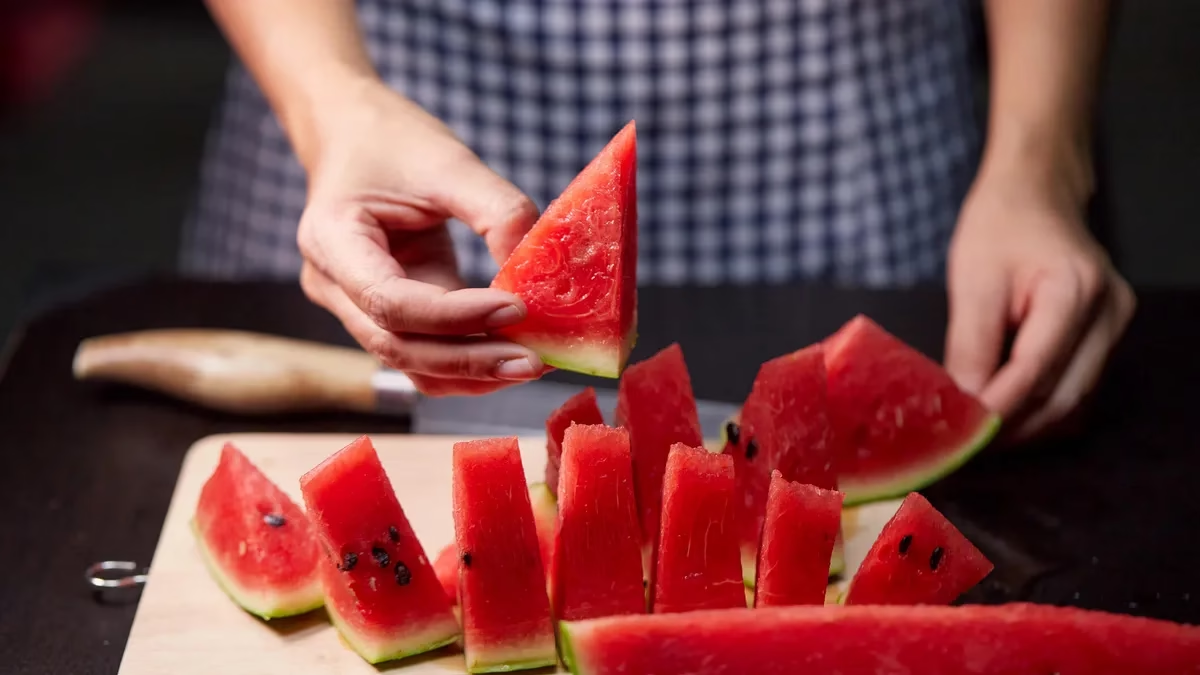Picture of a watermelon-Anucha Muphasa/500px/Getty Images
If you’re tired of reaching for painkillers every time a headache hits, your kitchen might offer some relief. While food isn’t a magic cure, experts agree that certain nutrient-rich choices can help prevent or ease headache and migraine symptoms—especially when combined with hydration, good sleep, exercise, and stress management.
We asked doctors and dietitians to share the best foods to try—and which ones to avoid—when your head starts to pound.
- Omega-3 Rich Foods: Nature’s Anti-Inflammatory
Fatty fish like salmon, mackerel, and sardines are packed with omega-3s, which help calm inflammation in your body, including your brain and blood vessels.
Dr. Nicholas Church explains that these healthy fats can lower the frequency and intensity of migraines. Bonus: they also contain brain-boosting nutrients like vitamin D and B vitamins.
Plant-based omega-3 sources: chia seeds, walnuts, flaxseed, and algae oil.
- Magnesium-Packed Foods: A Mineral Your Brain Needs
Many migraine sufferers have low magnesium levels. Studies show it can influence brain functions linked to headaches.
Top picks: pumpkin seeds, spinach, kale, broccoli, Swiss chard, and avocado.
- Ginger: A Soothing, Natural Remedy
Ginger isn’t just for nausea—it’s also a powerful anti-inflammatory. Several studies show that ginger tea or supplements can reduce migraine pain and symptoms, with fewer side effects than traditional medications.
Hydrating with ginger tea gives you a double benefit: water and healing compounds like gingerol.
- Nuts and Seeds: Tiny Powerhouses
Nuts and seeds—especially almonds, sunflower seeds, pumpkin seeds, and walnuts—are rich in magnesium and vitamin E, both linked to migraine relief. Some research even shows they may help with hormonal migraines.
- Cinnamon: A Sweet Spice with Healing Powers
Cinnamon is packed with antioxidants. Stir it into oatmeal, sprinkle it in tea, or add it to baked goods. A 2020 study found cinnamon supplements could reduce migraine frequency and severity.
- Vitamin B2 (Riboflavin) Foods: Energy for Your Brain
Vitamin B2 plays a big role in how your brain produces energy. Low levels may trigger migraines. While supplements are often used in high doses, eating eggs, dairy, and lean meats helps support your body naturally.
- Turmeric: A Golden Anti-Inflammatory
Turmeric’s active compound, curcumin, works best when paired with omega-3s. Together, they may help prevent migraines. Add turmeric to curries, smoothies, or golden milk lattes.
- Whole Grains: Fuel Without the Crash
Whole grains like oats, quinoa, and brown rice offer steady energy and are full of fiber, magnesium, and B vitamins. They help regulate blood sugar, which can be a headache trigger when it spikes or crashes.
- Water-Rich Foods: Stay Hydrated
Dehydration is a known migraine trigger. Munching on cucumber, watermelon, and citrus fruits can help you stay hydrated and refreshed.
Foods That Can Trigger Headaches
Experts say these common foods may cause headaches for some people:
- Chocolate, cheese, alcohol – Among the top triggers for many migraine sufferers.
- Gluten – Can cause inflammation in sensitive individuals.
- Caffeine – A little can help, but too much can cause rebound headaches.
- Sugary and highly processed foods – A Western diet full of additives and preservatives raises your migraine risk.
- Nitrates and MSG – Found in deli meats and some packaged foods, these can set off headaches in some people.
Final Thoughts
Your diet isn’t a cure-all, but it plays a big role in how often and how severely you experience headaches or migraines. Listen to your body, stay hydrated, and try adding more brain-friendly foods to your routine. If symptoms persist, always talk to your doctor.
#HeadacheRelief #FoodAsMedicine #MigraineTips #NaturalRemedies #EatWellFeelBetter
